- Home
- Greg Van Eekhout
Voyage of the Dogs Page 9
Voyage of the Dogs Read online
Page 9
That part wasn’t so bad, actually. Lopside liked bouncing around the dome, jumping ten feet in the air and coming down for a soft landing. With a running start, Daisy could leap across the entire width of the dome in a single bound. Games of midair chase and tug-of-war helped keep their minds off the seriousness of the situation. Champion watched with longing, wanting to join in, but her leg needed more time to heal.
They continued to listen to stories they’d already heard many times over. They listened to the story of Jade, a German shepherd who rescued a human baby left inside a bag in the woods. And Chips, the war dog who charged into a machine gun nest to save his soldiers from being shot to pieces. And Smoky, a Yorkshire terrier who performed tricks for hospital patients and was considered by some to be the very first therapy dog.
“Do you think they’ll tell stories about us someday?” Daisy said, snuggled with the others on their plastic tarp. Lopside lay curled up with the chicken eggs against his belly to keep them warm.
“No,” Bug said. “Someday we’ll tell our own stories.”
Things were quiet for a while, the four dogs inside the cold dome, crawling through space, until Lopside said, “Play another story.”
“I wish we could hear about Laika,” Daisy said, maybe for the thousandth time.
Bug sighed. “Me, too. I keep trying to find the file on Roro’s tablet, but it’s no use. It’s like it’s been erased or something.”
It was still the only story in The Great Book of Dogs they hadn’t heard.
Champion cleared her throat. “Listen, about the story of Laika—”
At that moment, Daisy let out a long, wailing howl. Startled, the other dogs leaped up and frantically sniffed her for injury or sickness.
“I’m okay,” she said with a sadly thumping tail. “I just miss Roro, that’s all.”
Lopside’s own tail drooped. “We all do, Daisy.”
They sniffed her again and resettled into their heap.
Lopside gave Champion an extra sniff. She was giving off a strange scent. “What was that you were saying about Laika?”
Champion rested her chin on her paws. “Nothing,” she said. “Nothing.”
Bip-bip-bip.
Beep-beep-beep.
Bip-bip-bip.
The electronic tones had come from the communications panel.
“Did I just imagine that?” Lopside asked, not daring to believe.
“No,” Champion said, her voice gruff. “I heard it, too.”
Lopside raced to the panel, the three other dogs trailing him.
They stood in a near silence of held breaths and strong heartbeats. They strained to listen, waiting, hoping the sounds would repeat.
Bip-bip-bip.
Beep-beep-beep.
Bip-bip-bip.
There was no mistaking it.
Three bips, three beeps, three bips.
Three dots, three dashes, three dots.
“Morse code,” said Lopside. “SOS.”
Someone was out there in the dark of space.
And they were calling for help.
Seventeen
THE PACK TOOK TURNS KEEPING watch over the control panel in case another SOS signal came through. But none did. Maybe the sensors had malfunctioned. Maybe they’d picked up some random bit of radiation bouncing around the asteroids. But Lopside couldn’t let it go. It was Morse code. He was sure of it. And that meant there were survivors out there. And if there were survivors, they had to be the Laika’s crew, because who else so far from Earth would know to send out a distress signal in Morse code?
“Even if they survived, how would we find them?” Bug argued. “Space is endlessly dark and vast. This is worse than looking for a needle in a haystack. This is like looking for a black needle in a black haystack taller than you can imagine.”
Daisy cocked her head in confusion. “What’s hay got to do with it?”
“He’s saying we’re looking for a lifepod in space,” Champion cut in. “A tiny lifepod. In huge space.”
Lopside didn’t want to hear anything more about needles and hay. He leaped in the reduced gravity and made it easily to the top of the sensor control panel.
On the left side of the display screen glowed a green ball labeled Laika Agricultural Dome. In the center of the screen was a white dot labeled HD 24040—the distant star. A number of smaller dots orbited the star, and one of them was labeled Stepping Stone. Dozens of more dots and squares and triangles represented moons and comets and asteroids. He lifted his head and looked out the dome. The nearest objects, a cluster of asteroids, were too far away and too small and too dim to see with the naked eye. On the sensor screen they showed up as tiny red triangles, not much more than freckles.
The Morse signal returned: bip-bip-bip, beep-beep-beep, bip-bip-bip.
The same sequence now, over and over.
“That settles it,” Lopside said.
Champion stood on her hind legs and rested her paws on the control panel. She panted with the pain from putting weight on her broken leg, but didn’t complain.
“The signal has to be coming from the asteroid field,” Lopside said, putting his paw over the little red triangles. “It’s only three hundred miles away.”
Champion regarded the display for a long time. “I don’t see what difference it makes. Three hundred miles or three hundred million miles. We have no engine capability. We couldn’t get closer to the asteroids even if we wanted to. Instead of wasting our time on the impossible, we should work on rigging up a transmitter. If we could get a signal out to whoever’s sending the SOS—”
Daisy lay on her belly and covered her eyes with her paws as Champion and Bug started arguing about what to do next.
Lopside barely listened to them. He stared at the display. The dome was just a few hours away from the asteroids. Compared to most distances in space, it was almost nothing, barely more than one small step. Bobbie the Wonder Dog had walked on his own for months. He’d crossed an impossible distance and faced dangers and hardships, all in the hope of finding his family again.
Lopside made a decision.
“The Rover,” he said.
Champion and Bug swallowed their barks. Daisy peered at Lopside through her paws. He had their attention.
“The Rover can do it. Just a few puffs from the maneuvering jets and it’ll go and keep on going until acted upon by another force. That’s Newton’s First Law, right?”
“Yes,” conceded Bug. “The same reason the dome is drifting toward Stepping Stone. Once on course, it’ll keep going unless something pulls it off course. But as slow as we’re going we’ll be long dead by the time we make it to the planet.”
“But I’m not talking about the planet,” Lopside argued. “I’m just talking about getting the Rover to the asteroid field. I’m talking about looking for survivors.”
Lopside could tell Champion was about to come up with reasons why he couldn’t do it, so he interrupted her before she could open her muzzle.
“With a fresh air recycler unit and a few ERPs, a dog could last for days inside the Rover.”
“Let’s say you survived in the Rover long enough to get to the nearest asteroid,” Champion said. “Look at the display, Lopside. There are hundreds of asteroids, spread out across thousands of miles. It’s still a needle in a haystack, and making it out to the haystack is going to kill you.”
“It’s a lot to risk,” Bug said. “Too much.”
Lopside barked. “It’s what Barry the Saint Bernard would do, heading out in a blizzard to save lost skiers. It’s what Balto and Togo would do to bring medicine across frozen tundra.”
“Those are stories,” Champion said. “For every Barry who became a hero, there are dozens of dogs who got lost in a blizzard and never came back. Even dogs whose owners left them out in the snow to freeze to death.”
The pack was against Lopside. He supposed it didn’t matter. He wasn’t like the rest of them. He wasn’t bred with an instinct to please others. His
instinct was to go out on his own. He could wait till they were asleep and then sneak out to the secondary airlock and take the Rover without telling them.
But he wasn’t just a dog.
He was a space dog.
A Barkonaut.
And the humans weren’t just crewmates. They were pack.
“I wouldn’t be risking myself to save just any humans,” Lopside said. “I’d be risking it to save Commander Lin. And Crew Specialist Dimka. And Medical Officer Ortega.”
He could smell Champion’s resolve begin to waver.
“I’d be risking my life for Roro.”
He wagged his tail.
Even though the prospect of leaving the pack and the dome behind and setting out into the unknown terrified him, he couldn’t help but be excited. The human crew was somewhere out there. Roro was out there. He believed it. He knew it. Almost.
Gingerly, Champion lowered herself to the ground. “Do you want to hear Laika’s story?” she said.
Lopside jumped down off the control panel. “But . . . it’s not in the book.”
“I know it’s not,” Champion said. “I listened to it. And then I erased it.”
At first Lopside could only stare, dumbfounded. Then, slowly, like a kettle coming to a boil, he felt pressure building in his head. Resentment. Anger. Fury. Glaring hard into Champion’s brown eyes, he said, “You are a bad dog.”
Bug looked like he wanted to bite her. Even Daisy vibrated with a low, dangerous growl.
Champion’s tail drooped. “I know I’m a bad dog,” she said. “And I’m sorry. I thought . . . if you and the others knew Laika’s story . . . her full story . . . it would change things. It would change the way you feel.”
“About you?” Lopside didn’t know how his feelings for Champion right now could change for the worse.
“No. About humans. About Roro.”
How could Laika’s story change the way he felt about Roro? How could his feelings change for the person who had found him in the cold mud next to a tree on a rainy morning?
“Do you want to hear it now?”
Lopside hesitated. Champion wasn’t acting superior. She was frightened, and not for herself. He sensed that more was at stake than just his curiosity.
“Yes,” Lopside said. “I want to hear it. I want to hear it now.”
“We all do,” Bug said.
“Then come with me,” Champion said, limping away. “We’ll meet at the tarp.”
Eighteen
“LAIKA WAS A STRAY LIVING in the streets of Moscow in the 1950s. It wasn’t the worst place for a dog. People liked dogs there. They didn’t treat them like vermin to be chased off and killed. Instead, they accepted them as part of city life. They let strays sleep in doorways, or the lobbies of buildings. Dogs had free run of the subways. They could get on the trains and ride them wherever they wanted to. But it still must have been a tough life for Laika. Moscow in winter is terribly cold.”
Nobody lay down or curled up on the plastic tarp as Champion told the story. All the dogs sat straight on their haunches. Champion hadn’t chosen this place because it was cozy and comforting, but because the place where the dogs slept was an important place, and the story of Laika was important.
“She must have thought she was lucky to be chosen by the Soviet space program,” Champion went on. “She was out of the weather, indoors, and warm. They gave her the best food. They made sure she was healthy. She was never alone, never lonely. She had all kinds of visitors. Important people, photographers, reporters. They were delighted at everything she did. She would chew on a bone and they would laugh. She would chase a ball and they’d applaud. She had no way of knowing that it would all come to an end. When the engineers sealed her inside her spaceship, a little steel ball they called Sputnik 2, she must have thought she’d be seeing their smiling faces again soon. But it was never their plan to bring Laika home alive. They knew she would die in space. The engineers, the technicians, the reporters, even the public. Everyone knew it. Everyone except Laika.”
Lopside thought the gravity had failed, because the floor seemed to tilt sideways, and his stomach seemed to float up into his throat. But it wasn’t a mechanical problem. It was the realization of what Champion had just told them.
“Laika was supposed to run out of oxygen and suffocate painlessly. Instead, there was a malfunction, and she overheated. Honestly, I don’t know if it matters how she died. All I know is she went up there not knowing the truth about her own mission, and she died alone. Proving they had the technology to send a living dog into space was more important to her masters than bringing her back alive. And our trainers back on Earth knew this whole story. Our ship’s human crew knew it. Commander Lin knew it.” She paused and looked into Lopside’s eyes. “And Roro knew it, too.”
None of the dogs said anything for a while. Daisy let out a small whimper, but that was it.
“Do you believe me?” Champion said at last.
“Yes,” Daisy said miserably.
Bug grunted. “Yes.”
They all looked at Lopside, waiting to hear what he’d say.
He was angry at Champion, but he knew she was telling the truth.
“Then I’m going to ask you again,” Champion said. “Somewhere in that asteroid wilderness, there may be surviving members of our crew. And that’s a big maybe. That SOS could be a stray signal, bouncing around space. It could be coming from a piece of lifepod wreckage. It could be anything. But if it is a survivor, it’s a human from a ship named after a brave dog who was lied to. Who was blasted into space without knowing it was a one-way trip, that she was being sent up to die. Do you still want to risk your life for that, Lopside?”
The answer froze in Lopside’s throat.
What was the last thing Laika saw before being sealed into her capsule?
It must have been a human.
Did the human pet her? Did the human scritch her?
Did Laika get a final belly rub? Did anyone sneak her a last treat?
Did she get a smile?
Did anyone tell her she was a good dog?
Did she feel loved?
If the answer to any of those questions was yes, that only made it worse. It meant that humans could give comfort and affection and love while telling a lie. They could call you a good dog while sending you to your death.
Knowing that truth, how could Lopside still be loyal to a human?
“Are we even Barkonauts anymore?” He honestly wasn’t sure.
“I think . . . yes,” Bug said. “I think I’m still a Barkonaut.”
“I don’t know what else I’d be,” Daisy said.
Champion sniffed Lopside’s face. “I know what you’re feeling,” she said. “I asked myself the same questions. It’s for each one of us to decide for themselves. But yes, I’m still a Barkonaut.”
Hearing the others’ answers helped Lopside form his own decision. Barkonauts were dogs who completed their missions. And that was what Lopside wanted to do.
“If there’s someone to be saved,” he said, “I’m going to try to save them.”
Champion hesitated only a moment. “Then let’s get to work.”
Nineteen
“YOU HAVE THREE ERPS, A fresh oxygen recycler, and a quart of almost fresh water,” Bug told Lopside. “Okay, not very fresh at all, but it’s drinkable.”
The mood in the airlock smelled urgent and tense. Champion insisted that the Rover be checked, double-checked, triple-checked, and then checked again. Lopside was already exhausted and he hadn’t even left the dome yet.
“How much propellant does the Rover have?” he asked.
“Half a gallon. That’s enough for an hour of continuous fire. So don’t waste it. Short squirts only. That’s all you need to get moving or change direction. Momentum will do the rest.”
“Newton’s First Law,” Lopside said, grateful for Bug’s coaching. “I remember.”
Daisy rushed up and shoved her big wet nose in Lopside’s face. “
It’s not fair that I’m too big to fit in the Rover. You already went out once, and I haven’t gotten to go out at all.”
“I’m sorry,” Lopside said. “You’ll have to keep Bug and Champion safe while I’m gone.”
Lopside touched his nose to hers, and somehow that small gesture felt as though he were saying good-bye, and he felt the weight of a million gravities.
Champion came over and sniffed his butt and muzzle to make sure he was okay. “Bug set the dome’s comm system to send out a signal pulse once every thirty seconds. It’ll sync with the Rover’s comm, so that way we can keep track of your location.”
The idea of keeping in contact with his packmates sent a wave of comfort spreading through Lopside’s belly.
“Unless an asteroid interferes with your signal,” Bug said. “Then we won’t be able to talk and will have no idea where you are.”
Bug was just a dog-shaped bucket of ice water.
Lopside wanted to get under way before he could change his mind. “I’m ready. The Rover is more than ready. Let’s get going.”
And so he crawled into the Rover’s tool compartment. Champion quadruple-checked to make sure Lopside was sealed in there good and tight, and then she, Daisy, and Bug squeezed into the tiny observation chamber outside the airlock.
“Comm check,” Champion said over the radio. “Am I coming in?”
“Loud and clear,” Lopside responded. He had to respond six more times before Champion was satisfied that the communications system was working.
“I’ll be monitoring you every step of the way, no matter how long it takes,” she said.
“We’ll be monitoring,” Bug cut in.
“If you don’t open the airlock and let me outside right now I’m turning my radio off,” Lopside threatened. He fooled nobody, including himself. He was scared. He wanted to stay inside the dome. He wanted to be with his pack. But if there were human survivors out among the asteroids, they must be even more scared.
“Opening airlock doors now,” Champion said.
The double doors creaked open, and all the air in the airlock escaped with a great whoosh.

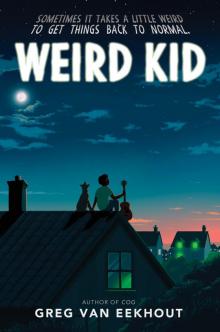 Weird Kid
Weird Kid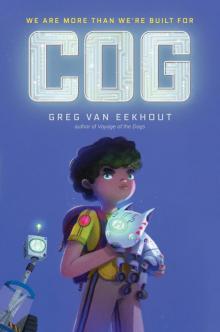 Cog
Cog The Boy at the End of the World
The Boy at the End of the World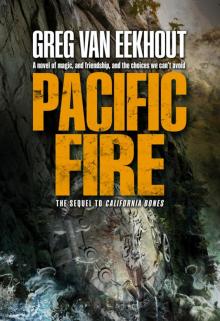 Pacific Fire
Pacific Fire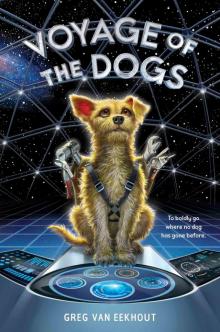 Voyage of the Dogs
Voyage of the Dogs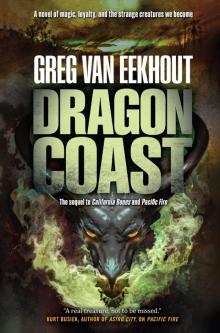 Dragon Coast
Dragon Coast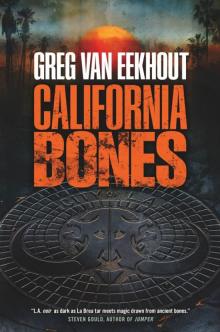 California Bones
California Bones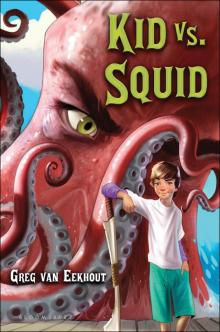 Kid vs. Squid
Kid vs. Squid